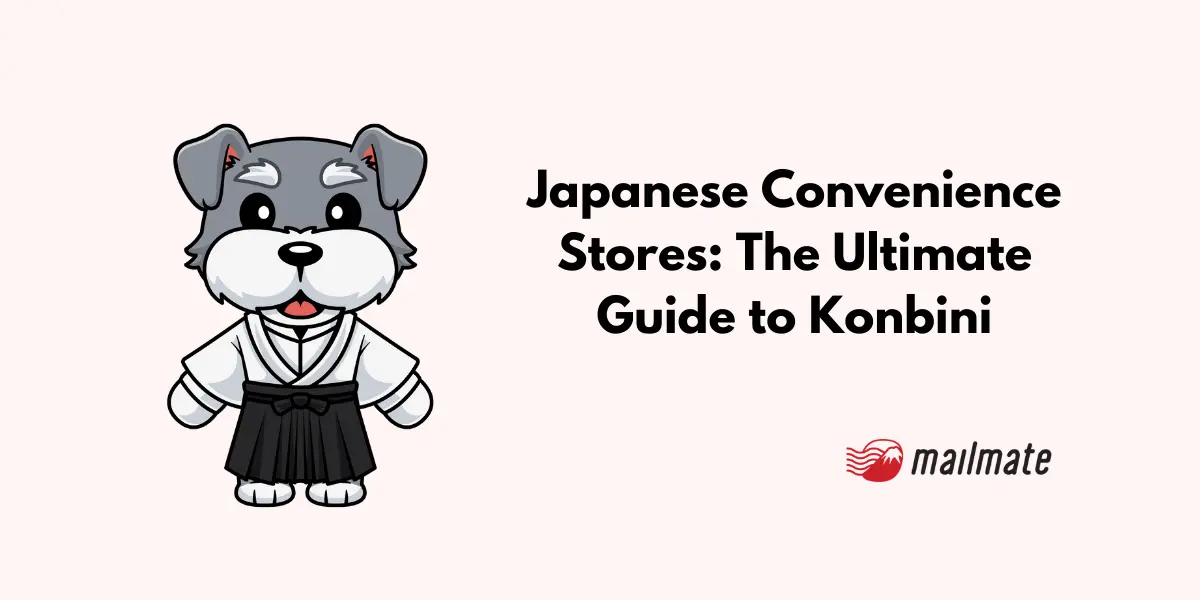Japanese Convenience Stores: The Ultimate Guide to Konbini

With over 56,000 convenience stores, you're bound to immediately see one when you land in Japan.
Who knew the Japanese took the word “convenience” seriously? Back in the US, I rarely went to the convenience store because it only served as a place to get slushies.
But convenience stores in Japan are on another level. Keep reading to see how and why Japanese convenience stores are the best.
What is a Japanese convenience store?
Japanese convenience stores, usually referred to as "konbini," are stores known for their convenience and services. They are part of Japanese daily life and are everywhere throughout Japanese cities, residential neighborhoods, and even rural parts of Japan.
Note: Sometimes you will see “conbini” for the spelling, and that is also correct.
What are the top Japanese convenience stores?
Many people will say that 7-Eleven is the top Japanese convenience store, but you will also see Lawson and Family Mart all over Japan. Regional konbini chains also exist such as NewDays, which are often inside of JR East stations.
Things you can do at Japanese convenience stores
Food and beverages

One of the most surprising things is the amount of food and drinks that konbini offers. According to a Nippon.com survey, 52% of those surveyed bought their lunch once a week from a convenience store.
Drinks
There are so many different drinks that konbini offers. In a typical Japanese convenience store, you will see that they will separate space for cold and hot drinks.
Bottled water, assorted teas, creamy lattes, refreshing milk teas, flavorful juice, sparkling soda, and even milk are often sold, too.
Coffee has its own dedicated section. While all the stores do sell bottled coffee, you can buy a cup to make fresh hot or iced coffee on the spot.
Additionally, you can also buy Japanese alcohol in a konbini, such as beer, sake, umeshu, sours, highball, and wine.
Food items
Konbini is super convenient when you don't want to cook or need a quick snack.
They have various fresh hot foods ranging from meat buns, fried chicken, oden, and curry bread.
Along the walls, they will have a section of reheatable meals, including bento (Japanese lunch boxes), pasta, ramen, and rice bowls. Within the same section, they will also sell onigiri (rice balls) and sandwiches that don't need to be reheated.
You can also buy instant noodles and most stores will have a hot water pot so you can make and eat it within the store.
Additionally, there are plenty of snacks you can buy such as Japanese rice crackers, various chocolate snacks, gummies, and so on.
Services

Multi-use machines
Also known as a photocopier or Xerox machine, all Japanese convenience stores allow you to print, scan, copy, and fax at a reasonable cost.
These machines will accept files from micro SD cards, SD cards, USBs, and CDs. You can even print from your phone by downloading the store's respective print app and scanning in the QR code.
And it’s so cheap, too! A standard A4 paper will cost ¥10 per page in black and white while it will cost ¥50 for color. You can print 2-8 pages per sheet, front and back, and choose the alignment for your prints. Additionally, you can do bulk printing, print photos, and print posters.
Don't worry if you don't speak Japanese as you can change the interface language of the multi-use machine.
International ATMs
Many convenience stores in Japan offer international ATMs.
If your debit or credit card is from Japan, you won’t have any issues with these ATMs for withdrawals.
However, if you have a foreign card, you may experience some issues such as a limit to the amount you can withdraw, service and use charges, and additional fees from your card issuer.
It is recommended that you notify your bank and credit card company before an upcoming Japan trip so that your card will not be blocked for fraud.
Mail and ship items
Need to send a package, but the Japan Post office is closed? You can drop off and pick up packages such as luggage or parcels at any Japanese convenience store.
If you have all the documents and stamps, you can even take care of items for international shipping, but this will vary depending on the konbini chain. You can ask the staff if this service is available.
Pay bills
While you can connect your bank account or credit card to your utility bills for automatic payments, convenience stores also offer a way to pay your bills in person.
You just need to bring your utility bill to the konbini counter and the staff will scan it. Then you pay the amount, and the staff will stamp it. Now your bills are paid.
Please note that you can't use your credit card to pay these types of bills. But if you have a point card associated with any of these convenience stores, use your points.
Get tickets
Many Japanese convenience stores will have dedicated machines that allow you to print out reservation tickets. These reservation tickets are like a pre-receipt. You then bring that paper to the counter and pay with either cash, card, or points. The staff will print the actual ticket for you to bring to your event.
How to get tickets from Japanese konbini | JapanesePod101Different ticketing machines will sell different tickets, so be sure to check online for where your tickets are sold.
Through this method, I was able to reserve and get Ghibli Museum tickets and USJ tickets. But you have to already be in Japan as there is a time limit to pay and get the tickets.
Connect to WiFi
Many convenience stores in Japan have free wifi for you to use.
Products
Reading materials
Many convenience stores will sell popular manga, newspapers, and magazines. There will also be various products related to these items such as figures near the manga books.
Limited-edition items
Many convenience stores will sell limited-edition items ranging from food to physical items depending on the time of year or if certain brands are running a media campaign.
Some stores will have "ichiban kuji" which is a lottery prize system with exclusive prizes based on well-known games and anime.
Basic toiletries
If you forgot to pack basic toiletries, you can buy them at any convenience store chain.
They will have toothbrushes, toothpaste, basic makeup, shampoo and conditioner, hairspray, makeup remover, deodorant, and more.
Technology
Many convenience stores will sell various technological products ranging from phone chargers, cables, battery sizes, earphones, etc. no matter which phone brand you use.
Basic stationery
Pens, paper, and different-sized notebooks are also on sale if you need a quick restock.
Facilities
Open 24/7
Most konbini, if not all, are open 24 hours a day, 7 days a week providing convenience for anyone at any time of the day.
Bathroom usage
Most konbinis that I've been to will have a bathroom somewhere in the store. You don't need to buy something to use this facility. There were plenty of times when I walked through a store thinking I wanted to buy a snack but ended up walking out.
Additionally, from what I can see, people will use the toilet and then buy something. But overall, just be considerate while in the store.
Sit and dine
When at the register, the staff will ask you if you would like a food item to be reheated. You can immediately eat it right away in the store as most konbini will have a small dining area. The staff will also give you utensils and napkins for your food.
Around the eating area, there might also be a separate microwave and a hot water dispenser to reheat other food and make instant ramen.
In closing
With a different array of food and beverage options, different services, products, and facilities, you can see how konbini is part of Japanese daily life. So whether you need a quick bite, pay your bills, or do a quick pit-stop, Japanese convenience stores will be your go-to.
Spending too long figuring out your Japanese mail?
Virtual mail + translation services start at 3800 per month. 30-day money-back guarantee.

